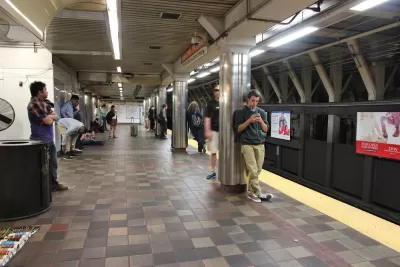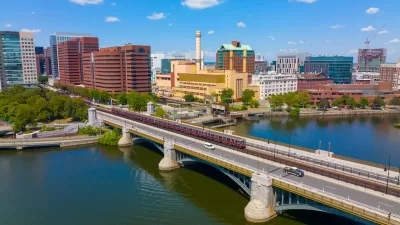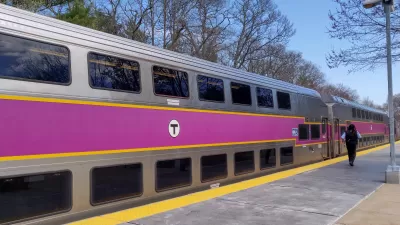With ridership revenue still lagging and fatal incidents plaguing the Boston-area transit agency, one writer argues that state lawmakers must step in to fund upgrades for the aging system.

After multiple fatal incidents, Rich Barlow argues that the Massachusetts Bay Transportation Authority (MBTA) “needs a state rainmaker” to upgrade its infrastructure and improve safety for its riders and operators. “The Massachusetts Legislature, under pressure from inspectors at the Federal Transit Authority, sent Gov. Charlie Baker a state budget with $266 million for correctives, and separate bond bills authorizing $400 million for infrastructure upgrades to meet the feds’ demands.”
According to Barlow, “The budget includes money for new dispatchers to end debilitating shifts of up to 20 hours. Staff shortages forced summer service cuts that likely will leave some commuters cooling their heels into next year.” Meanwhile, a proposal to reduce fares for low-income riders could cost an additional $85 million.
“Ridership remains more than one-third off its pre-pandemic level, depressed by remote work, virus surges, and users’ frayed patience with service problems.” But many commuters remain dependent on public transit, and encouraging transit over cars is one of the most effective ways to reduce greenhouse gas emissions. Thus, solving the agency’s financial woes is incumbent on state leaders, Barlow writes. “Massachusetts leaders long ignored their duty by ignoring an agency that serves more than just commuters; it’s simultaneously an anti-poverty policy — not everyone can afford a car, and those who can’t need transportation to their jobs — and a climate change policy.”
FULL STORY: Good grief, get the T some help

Planetizen Federal Action Tracker
A weekly monitor of how Trump’s orders and actions are impacting planners and planning in America.

Congressman Proposes Bill to Rename DC Metro “Trump Train”
The Make Autorail Great Again Act would withhold federal funding to the system until the Washington Metropolitan Area Transit Authority (WMATA), rebrands as the Washington Metropolitan Authority for Greater Access (WMAGA).

The Simple Legislative Tool Transforming Vacant Downtowns
In California, Michigan and Georgia, an easy win is bringing dollars — and delight — back to city centers.

The States Losing Rural Delivery Rooms at an Alarming Pace
In some states, as few as 9% of rural hospitals still deliver babies. As a result, rising pre-term births, no adequate pre-term care and harrowing close calls are a growing reality.

The Small South Asian Republic Going all in on EVs
Thanks to one simple policy change less than five years ago, 65% of new cars in this Himalayan country are now electric.

DC Backpedals on Bike Lane Protection, Swaps Barriers for Paint
Citing aesthetic concerns, the city is removing the concrete barriers and flexposts that once separated Arizona Avenue cyclists from motor vehicles.
Urban Design for Planners 1: Software Tools
This six-course series explores essential urban design concepts using open source software and equips planners with the tools they need to participate fully in the urban design process.
Planning for Universal Design
Learn the tools for implementing Universal Design in planning regulations.
Smith Gee Studio
City of Charlotte
City of Camden Redevelopment Agency
City of Astoria
Transportation Research & Education Center (TREC) at Portland State University
US High Speed Rail Association
City of Camden Redevelopment Agency
Municipality of Princeton (NJ)





























